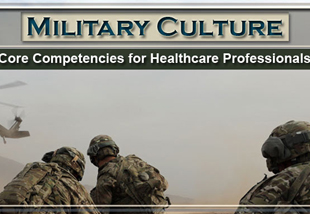PTSD: National Center for PTSD
Military Culture: Core Competencies for Healthcare Professionals
Continuing Education
This section brings together free in-depth Continuing Education resources for the Professional community concerned with trauma.
Military Culture: Core Competencies for Healthcare Professionals
- Date Created: 12/ 2/2015
- Time to Complete: 4 2-hour modules
- Credits: ANCC, APA, ASWB, CA BBS, ACCME, NBCC
- Skill Level: Basic
Start Learning
Credit
Take the Course
Modules are on TRAIN.
| 1. | Self-Assessment and Intro to Military Ethos |
| 2. | Military Organization and Roles |
| 3. | Stressors and Resources  |
| 4. | Treatment, Resources and Tools  |
Earn CE/CME Credits
 Author(s):
Author(s):
Description
Understanding military culture can allow clinicians to tailor clinical practices for military patients who have been shown to delay care seeking, drop out of care, or receive misdiagnoses. This course, jointly developed by the Department of Veterans Affairs and Department of Defense, describes military organizations and roles, reviews military-specific stressors, and provides treatment tools for best practices with military patients.
This interactive course includes video to illustrate how core competencies related to military culture improve the therapeutic alliance and support effective treatment planning for Service members and Veterans.
Goals and Objectives
- Describe the characteristics and functions of military ethos and how it may impact clinical presentation and interactions providers have with military patients.
- Determine how health care professionals can apply knowledge of military organization and roles to improve practice.
- Describe stressors unique to military life (e.g., deployment).
- Identify military support systems and services.
- Identify ways to incorporate military cultural competency into assessment and treatment planning and provision.
- Learn how to facilitate processing.
- Identify ways to incorporate military cultural competency into assessment and treatment planning and provision.
Learn more on the Center for Deployment Psychology website .
.























